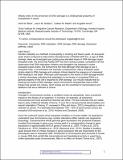| dc.contributor.author | Sheltzer, Jason Meyer | |
| dc.contributor.author | Blank, Heidi Marie | |
| dc.contributor.author | Meehl, Colleen M. | |
| dc.contributor.author | Amon, Angelika B | |
| dc.date.accessioned | 2015-04-07T18:53:55Z | |
| dc.date.available | 2015-04-07T18:53:55Z | |
| dc.date.issued | 2015-02 | |
| dc.date.submitted | 2015-01 | |
| dc.identifier.issn | 1059-1524 | |
| dc.identifier.issn | 1939-4586 | |
| dc.identifier.uri | http://hdl.handle.net/1721.1/96415 | |
| dc.description.abstract | Genetic instability is a hallmark of aneuploidy in budding and fission yeast. All aneuploid yeast strains analyzed to date harbor elevated levels of Rad52-GFP foci, a sign of DNA damage. Here we investigate how continuously elevated levels of DNA damage impact aneuploid cells. We show that Rad52-GFP foci form during S phase, consistent with the observation that DNA replication initiation and elongation are impaired in some aneuploid yeast strains. We furthermore find that although DNA damage is low in aneuploid cells, it nevertheless has dramatic consequences. Many aneuploid yeast strains adapt to DNA damage and undergo mitosis despite the presence of unrepaired DNA leading to cell death. Wild-type cells exposed to low levels of DNA damage exhibit a similar phenotype indicating that adaptation to low levels of unrepaired DNA is a general property of the cell's response to DNA damage. Our results indicate that by causing low levels of DNA damage, whole chromosome aneuploidies lead to DNA breaks that persist into mitosis. Such breaks are the substrate for translocations and deletions that are a hallmark of cancer. | en_US |
| dc.description.sponsorship | National Institutes of Health (U.S.) (GM056800) | en_US |
| dc.description.sponsorship | National Institutes of Health (U.S.). Ruth L. Kirschstein National Research Service Award (Fellowship) | en_US |
| dc.description.sponsorship | National Science Foundation (U.S.). Graduate Research Fellowship Program | en_US |
| dc.description.sponsorship | National Cancer Institute (U.S.) (Koch Institute. (Core) Grant P30-CA14051) | en_US |
| dc.language.iso | en_US | |
| dc.publisher | American Society for Cell Biology | en_US |
| dc.relation.isversionof | http://dx.doi.org/10.1091/mbc.E14-10-1442 | en_US |
| dc.rights | Creative Commons Attribution | en_US |
| dc.rights.uri | http://creativecommons.org/licenses/by-nc-sa/3.0/ | en_US |
| dc.source | American Society for Cell Biology | en_US |
| dc.title | Mitotic entry in the presence of DNA damage is a widespread property of aneuploidy in yeast | en_US |
| dc.type | Article | en_US |
| dc.identifier.citation | Blank, Heidi M., Jason M. Sheltzer, Colleen M. Meehl, and Angelika Amon. “Mitotic Entry in the Presence of DNA Damage Is a Widespread Property of Aneuploidy in Yeast.” Molecular Biology of the Cell (February 18, 2015). | en_US |
| dc.contributor.department | Massachusetts Institute of Technology. Department of Biology | en_US |
| dc.contributor.department | Koch Institute for Integrative Cancer Research at MIT | en_US |
| dc.contributor.mitauthor | Sheltzer, Jason Meyer | en_US |
| dc.contributor.mitauthor | Meehl, Colleen | en_US |
| dc.contributor.mitauthor | Amon, Angelika B. | en_US |
| dc.contributor.mitauthor | Blank, Heidi Marie | en_US |
| dc.relation.journal | Molecular Biology of the Cell | en_US |
| dc.eprint.version | Final published version | en_US |
| dc.type.uri | http://purl.org/eprint/type/JournalArticle | en_US |
| eprint.status | http://purl.org/eprint/status/PeerReviewed | en_US |
| dspace.orderedauthors | Blank, Heidi M.; Sheltzer, Jason M.; Meehl, Colleen M.; Amon, Angelika | en_US |
| dc.identifier.orcid | https://orcid.org/0000-0001-9837-0314 | |
| dc.identifier.orcid | https://orcid.org/0000-0003-1381-1323 | |
| mit.license | PUBLISHER_CC | en_US |
| mit.metadata.status | Complete | |
